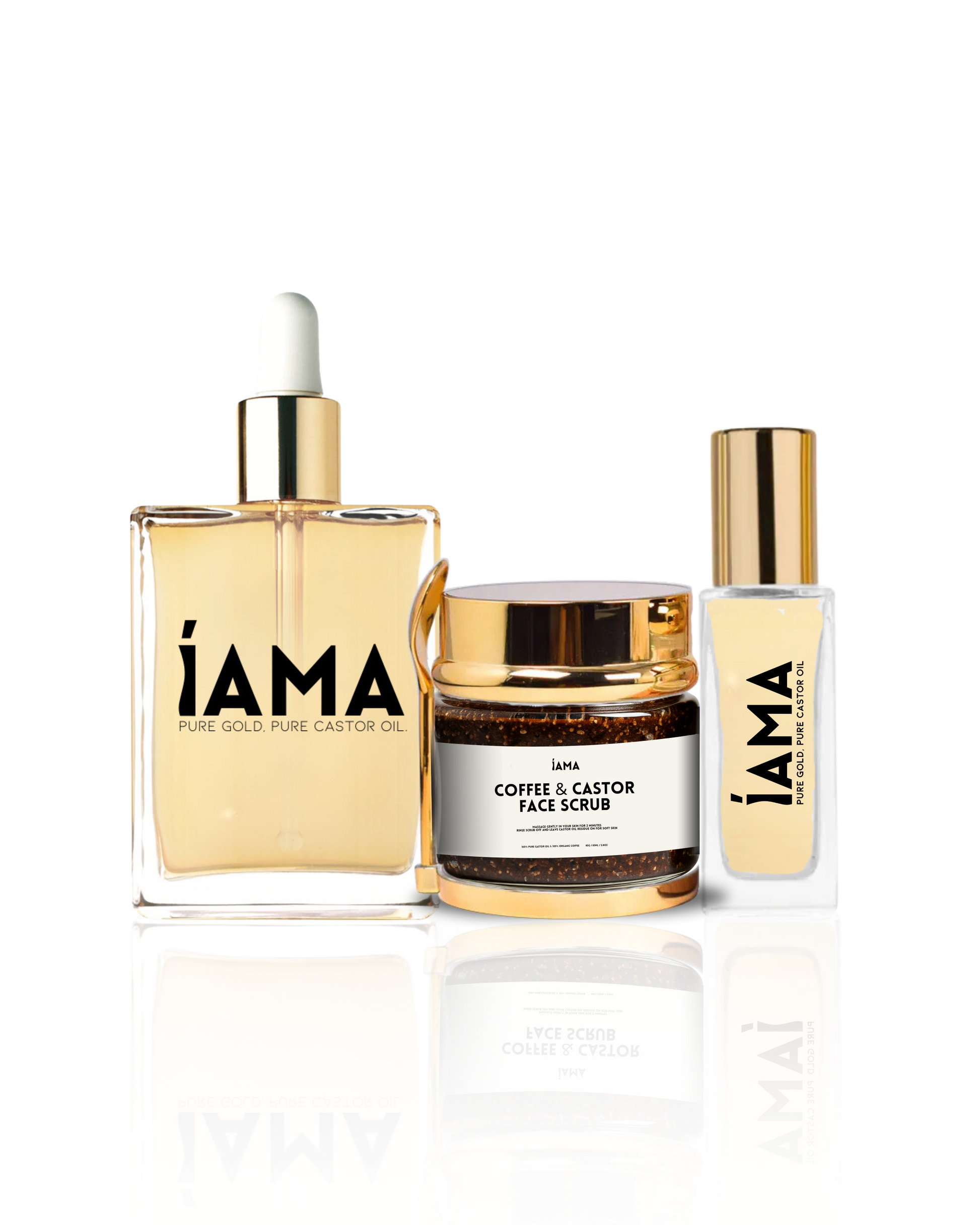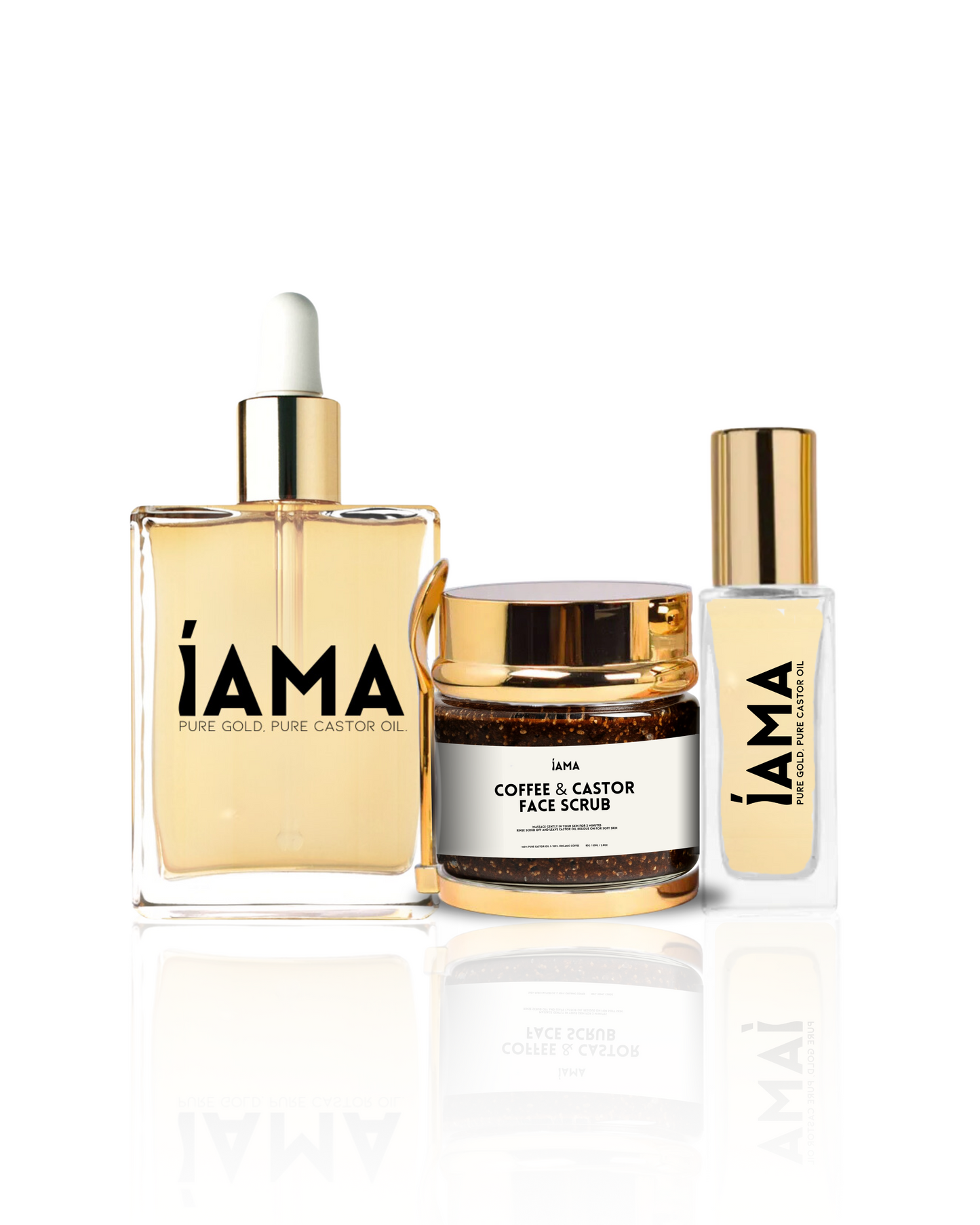If you’re looking for natural ways to support your vaginal health, castor oil could be a helpful option to consider. Its soothing, moisturizing, and anti-inflammatory qualities have made it a trusted remedy for centuries, including for intimate care.
Vaginal dryness is especially common during menopause - affecting up to half of postmenopausal women - and castor oil’s gentle moisturising effects may help ease the discomfort that comes with it. Beyond surface hydration, castor oil can help nourish the mucosal epithelium of the vagina, the tissue responsible for maintaining elasticity, lubrication, and overall barrier function. Healthy epithelial cells are essential for protecting against infections and maintaining comfort.

Vaginal dryness occurs when the tissues of the vagina don’t produce enough natural lubrication. This can lead to discomfort, itching, irritation, and pain during activities like intercourse or even everyday movement. On a physiological level, vaginal lubrication is influenced by the blood supply to the pelvic organs, estrogen-mediated mucosal thickness, and the activity of sebaceous glands in the vulva. When any of these systems are disrupted, tissues become fragile and less capable of retaining moisture.
Common causes include:
Hormonal Changes: Especially decreased estrogen during menopause, breastfeeding, or postpartum. Estrogen helps maintain the vaginal epithelium, collagen density, and blood vessel health - key for tissue hydration and resilience.
Medications and Medical Treatments: Antihistamines, antidepressants, hormonal contraceptives, radiation, and chemotherapy can all alter hormonal signaling or vascular perfusion, reducing natural lubrication.
Emotional Factors: Stress, anxiety, or unresolved trauma influence the autonomic nervous system and blood flow to pelvic organs, indirectly affecting lubrication.
Irritants: Soaps, detergents, douches, scented products, and other chemicals can disrupt the natural vaginal microbiome and epithelial barrier.
Underlying Health Conditions: Autoimmune diseases, diabetes, and infections can compromise mucosal integrity or inflammatory balance.
Chronic Illnesses: Inflammatory bowel disease, heart failure, and multiple sclerosis may impair neural and vascular support to pelvic tissues, exacerbating dryness.
During menopause, your body produces less estrogen, which is a key hormone that helps keep the vaginal tissues healthy and well-lubricated. Lower estrogen levels affect the extracellular matrix of vaginal connective tissue, reducing collagen and elastin fibers. This makes the tissues thinner, less elastic, and more prone to microtears.
When estrogen levels drop, the vaginal walls can become thinner, less elastic, and drier. Blood flow to the vaginal area decreases, which reduces delivery of oxygen, nutrients, and natural mucosal secretions. This further compromises the tissue’s ability to retain moisture and resist irritation. These changes are a normal part of menopause but can significantly affect your comfort and intimacy if not addressed.

Benefits of Organic Castor Oil for Vaginal Dryness
Castor oil offers a natural and gentle solution to help ease these symptoms. Its rich moisturizing properties deeply hydrate and nourish the delicate vaginal tissues, helping to restore softness and elasticity. On a cellular level, ricinoleic acid - the main fatty acid in castor oil - penetrates epithelial layers to enhance hydration, support lipid membrane integrity, and reduce micro-inflammation.
Castor oil’s anti-inflammatory effects can soothe irritation and reduce discomfort, making intimacy more comfortable. The oil may also modulate local inflammatory signaling pathways in vaginal tissues, calming cytokine activity that contributes to redness and sensitivity. Whether applied externally around the vulva or used internally in small amounts, castor oil creates a protective barrier that locks in moisture and supports the natural healing process of your skin.
By incorporating castor oil into your intimate care routine, you can help relieve vaginal dryness and reduce pain during intercourse, promoting greater comfort and confidence throughout menopause.
How to Use a Castor Oil Tampon for Vaginal Health
Castor oil offers incredible benefits - it helps improve blood flow, supports detoxification of the pelvic organs, and enhances tissue regeneration. Studies on topical ricinoleic acid show improved microcirculation and modulation of local inflammation, which can contribute to healing and tissue elasticity. It’s often used to promote womb healing and support fertility. If you’re exploring natural ways to relieve vaginal dryness or irritation, using a castor oil tampon can be an effective and simple method. This can be helpful if you’re recovering after childbirth, experiencing pelvic pain, or managing endometriosis
To try this method:
-
Soak a clean tampon in a small amount of iAMA pure organic castor oil
-
Gently insert it as you normally would
-
Leave the tampon in place for between 30 mins and 2 hours to allow the castor oil to deeply nourish and hydrate the vaginal tissues
-
Wait a few days before using it again to see how your body reacts
This method helps target dryness and irritation from the inside, delivering fatty acids directly to the mucosal epithelium and supporting local blood flow for nutrient delivery and tissue repair.

Alternative Internal Application
For more precise care, you can apply a small amount of castor oil to a clean finger and gently massage it around and just inside the vaginal opening. This allows you to focus on specific dry or sensitive areas. The gentle massage itself can enhance microcirculation and lymphatic flow in the pelvic region, supporting tissue detoxification and promoting local oxygenation. Always use clean hands and a small amount of oil to ensure comfort.
You don’t have to go internal to enjoy the benefits of castor oil.
Simply applying a thin layer around the vulva can work wonders for soothing external dryness, calming irritation, and supporting healthy, soft skin. The rich triglycerides in castor oil create a lipid barrier, preventing transepidermal water loss and reducing mechanical irritation.
You can also add castor oil to a panty liner for a simple and convenient way to provide ongoing moisture and soothing relief throughout the day. By lightly applying a small amount of castor oil onto a clean panty liner, you create a gentle barrier that helps protect sensitive skin from dryness and friction caused by hormonal changes.
Castor oil offers several natural benefits that make it an effective option for relieving vaginal dryness:
-
Moisturizing Fatty Acids: Ricinoleic acid penetrates tissue layers to restore hydration, maintain epithelial integrity, and support elasticity.
-
Anti-Inflammatory Properties: Reduces local cytokine activity and calms irritation, helping tissues repair and remain comfortable.
-
Protective Barrier: Forms a lipid layer that locks in moisture, protects against friction, and supports the natural microbiome of vaginal tissues.
-
Safe Alternative: Unlike chemical-based lubricants, castor oil is free from additives that could disrupt local pH or cause allergic reactions.
By maintaining hydration and supporting tissue resilience, castor oil works not just superficially but at a physiological level to enhance the function of vaginal mucosa, blood vessels, and connective tissues.
Research
- https://www.healthshots.com/intimate-health/sexual-health/castor-oil-for-vaginal-dryness
- https://www.onlymyhealth.com/benefits-of-castor-oil-for-vaginal-dryness-and-how-to-use-it-12977820947
Shop Now www.iamawellness.com
Contact us contact@iamawellness.com
Connect on Instagram @iamawellness






